Click here to download this notebook.
Missing Points
[2]:
import numpy as np
from casys.grids import InGridNetcdfParameters
from casys.readers import CLSTableReader
from casys import CasysPlot, CLSResourcesManager, DateHandler, NadirData
NadirData.enable_loginfo()
Dataset definition
[3]:
# Reader definition
table_name = "TABLE_C_J3_B_GDRD"
start = DateHandler("2019-07-20 19:23:06")
end = DateHandler("2019-07-30 17:21:37")
reader = CLSTableReader(
name=table_name,
date_start=start,
date_end=end,
time="time",
longitude="LONGITUDE",
latitude="LATITUDE",
)
# Data container definition
ad = NadirData(source=reader)
Definition of the diagnostic
The add_missing_points_stat method allows the definition of a missing points diagnostic.
In the following example, we are using a custom grid and grouping function allowing us a more precise differentiation of data according to the bathymetry values.
[4]:
manager = CLSResourcesManager()
grid_path = manager.bathymetry_path("1_12")
params = InGridNetcdfParameters(file_name=grid_path, z_name="Grid_0001")
def bathy_to_groups(x: np.ndarray):
res = np.empty(x.size)
res[np.where(x <= -3000)[0]] = 0
res[np.where((-3000 < x) & (x < 3000))[0]] = 1
res[np.where((3000 <= x) & (x < 5000))[0]] = 2
res[np.where(x >= 5000)[0]] = 3
return res
[5]:
ad.add_missing_points_stat(
name="Missing points",
reference_track="J3",
theoretical_orf="C_J3",
geobox_stats=True,
group_names={
"deep": 0,
"in-between": 1,
"high": 2,
"very high": 3,
"deep and high": [0, 2],
},
group_grid=params,
group_converter=bathy_to_groups,
temporal_stats_freq=["pass"],
section_min_lengths=[64, 128],
)
2025-05-14 10:57:06 WARNING Computed missing points will be using an ORF build with real measurements. Results might be incomplete.
Compute
[6]:
ad.compute()
2025-05-14 10:57:06 INFO Reading ['time', 'LONGITUDE', 'LATITUDE']
2025-05-14 10:57:09 INFO Computing diagnostics ['Missing points']
2025-05-14 10:57:09 INFO Searching missing points.
2025-05-14 10:57:21 INFO Computing done.
Plot
CasysPlot uses 5 parameters to determine what to plot:
plot: plot’s type (“map”, “temporal”, “geobox”, “section_analyses”)dtype: “all”, “missing”, “available”group: “global” (default: data from all groups) or any group defined in the group_names parameterfreq: required for temporal, frequency of the requested statisticsection_min_length: minimal length value of the section analysis to displaysections: optional for section analyses plot
Map plot
Refer to raw data diagnostics documentation for additional information.
Showing all values for the “deep and high” group:
[7]:
plot = CasysPlot(
data=ad,
data_name="Missing points",
plot="map",
dtype="all",
group="deep and high",
)
plot.show()
[7]:
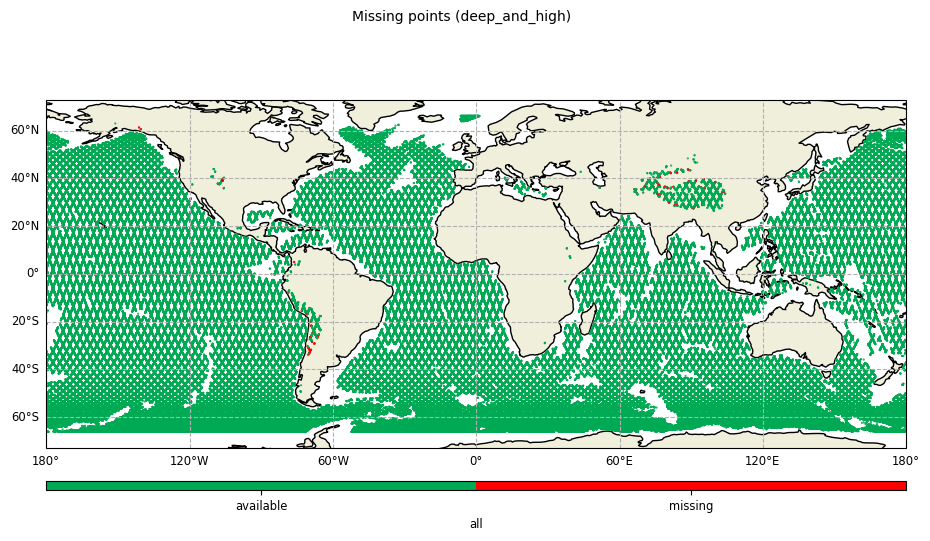
Along time diagnostics
Refer to along time diagnostics documentation for additional information.
Showing percentage of missing data for the “in between” group:
[8]:
plot = CasysPlot(
data=ad,
data_name="Missing points",
plot="temporal",
freq="pass",
dtype="missing",
group="in-between",
)
plot.show()
[8]:
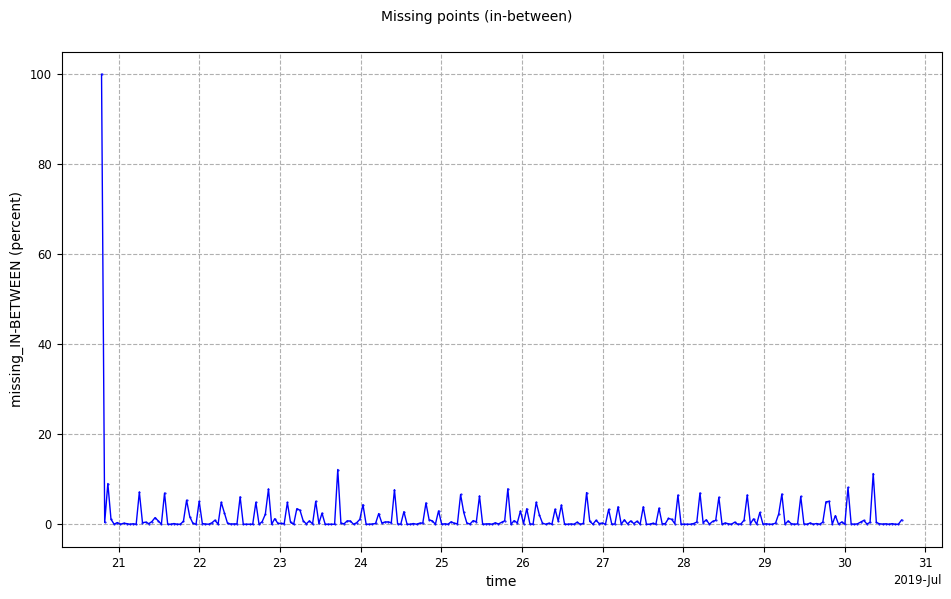
Geographical box diagnostics
Refer to geographical box diagnostics documentation for additional information.
Showing available data percentage as geographical boxes for the “high” group:
[9]:
plot = CasysPlot(
data=ad,
data_name="Missing points",
plot="geobox",
dtype="available",
group="very high",
)
plot.add_stat_bar()
plot.show()
[9]:
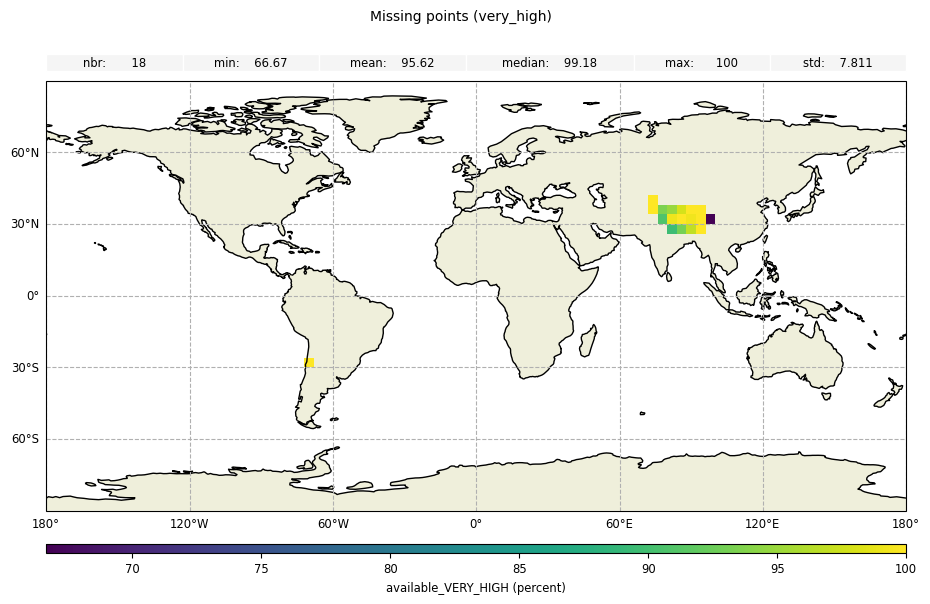
Section Analysis diagnostics
Refer to section analysis diagnostics documentation for additional information.
Showing all sections for missing points for the “global” group (default) and section_min_length=64:
[10]:
plot = CasysPlot(
data=ad,
data_name="Missing points",
plot="section_analyses",
section_min_length=64,
)
plot.add_stat_bar()
plot.show()
[10]:
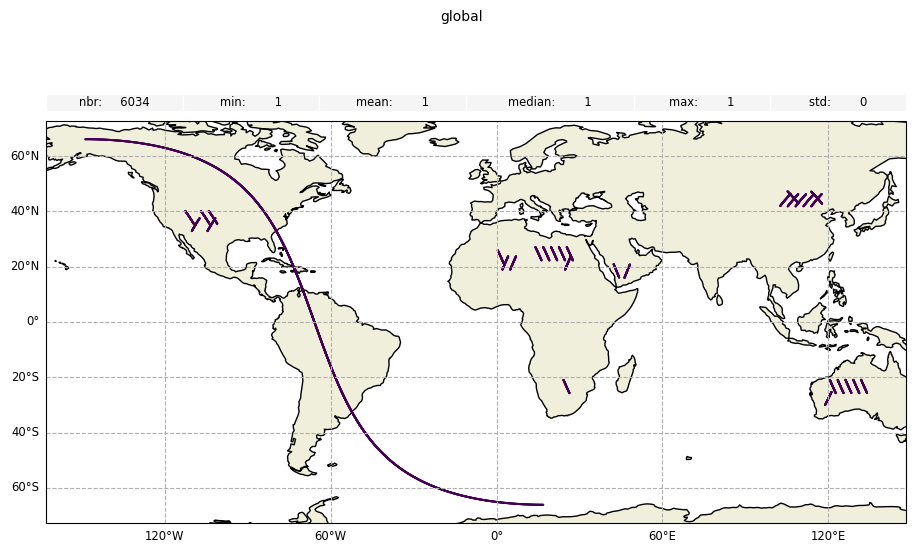
Showing all sections for missing points for the “deep and high” group and section_min_length=64:
[11]:
plot = CasysPlot(
data=ad,
data_name="Missing points",
plot="section_analyses",
group="deep and high",
section_min_length=64,
)
plot.add_stat_bar()
plot.show()
[11]:
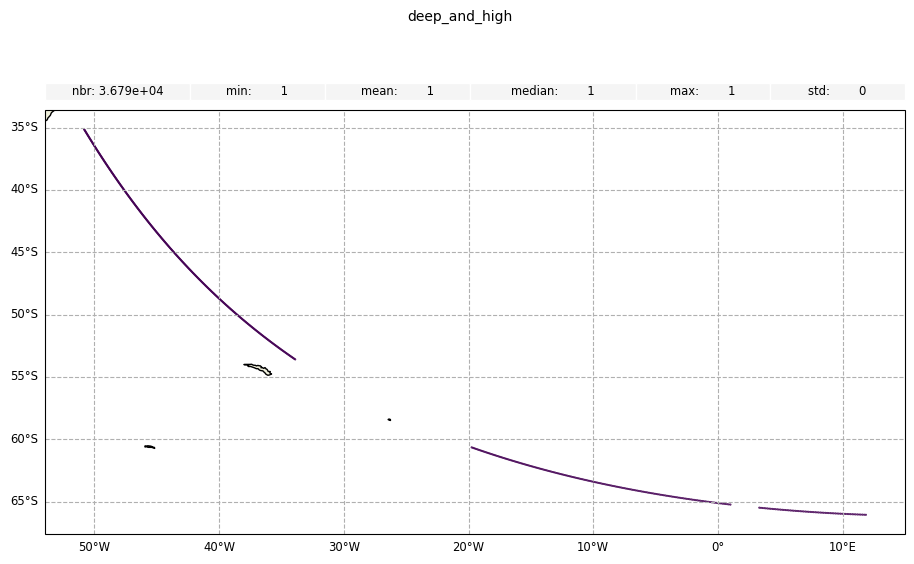
Showing all sections for missing points for the “global” group and section_min_length=128:
[12]:
plot = CasysPlot(
data=ad,
data_name="Missing points",
plot="section_analyses",
section_min_length=128,
)
plot.add_stat_bar()
plot.show()
[12]:
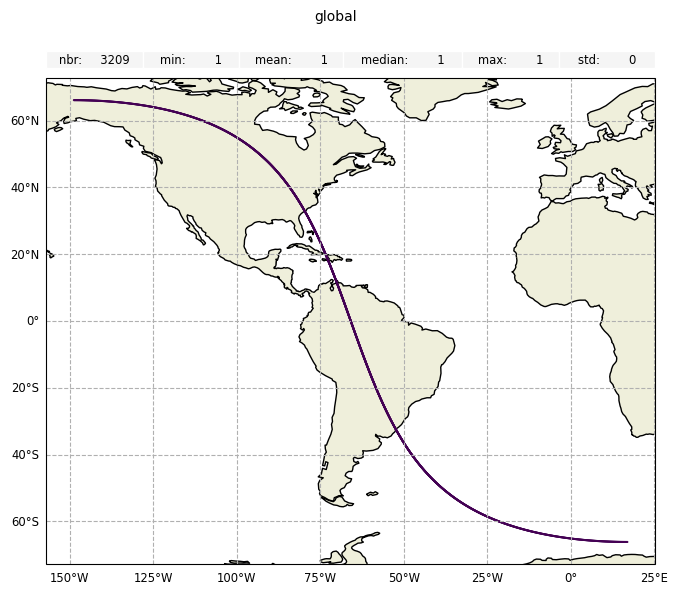
Selecting only the sections 2 and 3 for “global” group and section_min_length=64:
[13]:
plot = CasysPlot(
data=ad,
data_name="Missing points",
plot="section_analyses",
section_min_length=64,
sections=[2, 3],
)
plot.add_stat_bar()
plot.show()
[13]:

To learn more about missing points definition, please visit this documentation page.